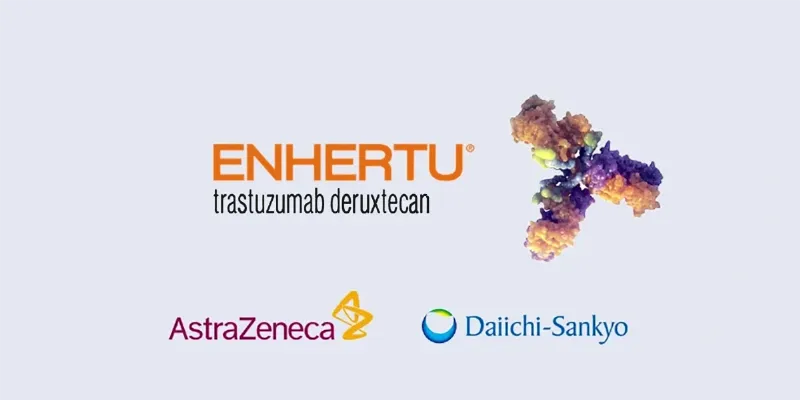DESTINY-Breast05: Enhertu Outperforms T-DM1 in High-Risk HER2+ Early Breast Cancer

1 October 2025
The Phase III DESTINY-Breast05 trial demonstrated that trastuzumab deruxtecan (Enhertu) significantly improved invasive disease-free survival compared with trastuzumab emtansine (T-DM1) in 1,635 patients with high-risk HER2-positive early breast cancer and residual disease after neoadjuvant therapy. Importantly, Enhertu’s safety profile was consistent with prior trials, and no new safety signals emerged.
Patients with high-risk HER2-positive early breast cancer who have residual disease after neoadjuvant therapy may soon face a new standard of care. Interim results from the DESTINY-Breast05 trial, to be presented at ESMO 2025, suggest Enhertu could surpass T-DM1 as the preferred post-neoadjuvant therapy. This is the second Phase III study to show benefit for Enhertu in early breast cancer, reinforcing its potential as a foundational curative-intent treatment.
Landmark Comparison in Post-Neoadjuvant Setting
DESTINY-Breast05 is the first head-to-head trial comparing Enhertu and T-DM1 in patients with residual invasive HER2-positive disease following neoadjuvant chemotherapy and anti-HER2 therapy. The global, open-label study enrolled 1,635 patients across Asia, Europe, Oceania, and the Americas. All patients were considered at high risk of recurrence, defined as initial presentation with inoperable cancer or persistence of axillary node positivity after neoadjuvant treatment.
“This landmark trial is the first to directly compare Enhertu and T-DM1 in early breast cancer, and the results clearly show that Enhertu delivers superior outcomes, indicating that it may be a better option for patients with high-risk HER2-positive disease in the post-neoadjuvant setting,” said Susan Galbraith, Executive Vice President, Oncology Haematology R&D, AstraZeneca.
At interim analysis, Enhertu demonstrated a highly statistically significant and clinically meaningful improvement in IDFS—the study’s primary endpoint. IDFS was defined as the time from randomization to recurrence of invasive breast cancer, distant recurrence, or death from any cause. Secondary endpoints included disease-free survival, distant recurrence-free interval, incidence of brain metastases, and overall survival (OS).
Clinical Context: Addressing an Unmet Need
Despite advances in HER2-targeted therapy, recurrence remains a major challenge. Up to 50% of patients with HER2-positive early breast cancer have residual disease after neoadjuvant treatment, and these patients face a substantially increased risk of progression to metastatic disease. Even with post-neoadjuvant T-DM1, recurrence rates remain clinically significant, underscoring the urgent need for more effective therapies.
“In patients with early breast cancer with residual disease following neoadjuvant treatment, it is critical to optimise treatment as this represents the last opportunity to prevent progression to metastatic disease. The results of DESTINY-Breast05 demonstrate that treatment with Enhertu following surgery increases the length of time patients are able to live free of invasive disease compared to the existing standard of care, potentially offering patients with HER2-positive early breast cancer a new treatment approach in this curative-intent setting,” said Ken Takeshita, Global Head, R&D, Daiichi Sankyo.
DESTINY-Breast05 in the Broader Enhertu Program
Enhertu, a HER2-directed antibody-drug conjugate (ADC) engineered with Daiichi Sankyo’s DXd technology, is already approved in multiple metastatic HER2-positive indications and HER2-low breast cancer. Its activity in early-stage disease was first confirmed in DESTINY-Breast11, which demonstrated strong efficacy in the neoadjuvant setting earlier this year.
The DESTINY-Breast05 trial was conducted in collaboration with major cooperative groups including the NSABP Foundation, German Breast Group, AGO-B, and SOLTI Breast Cancer Research Group. Results (Abstract #LBA1) will be presented in the Presidential Symposium at ESMO 2025, with regulatory submissions planned globally..











Comments
No Comments Yet!